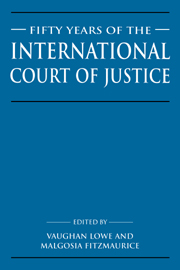Book contents
- Frontmatter
- Contents
- List of contributors
- Preface
- List of abbreviations
- Sir Robert Yewdall Jennings, by Vaughan Lowe
- List of publications of Sir Robert Jennings
- Table of cases
- Part I The International Court of Justice
- Part II The sources and evidences of international law
- Part III Substance of international law
- Part IV Procedural aspects of the work of the International Court of Justice
- 21 Procedural law and the International Court of Justice
- 22 The President of the International Court of Justice
- 23 Nationality of claims: some relevant concepts
- 24 The plea of domestic jurisdiction before the International Court of Justice: substance or procedure?
- 25 ‘Partial’ judgments and the inherent jurisdiction of the International Court of Justice
- 26 Intervention before the International Court of Justice
- 27 The use of Chambers of the International Court of Justice
- 28 The use of experts by the International Court of Justice
- 29 Provisional measures
- 30 Remedies in the International Court of Justice
- 31 A comment on the current health of Advisory Opinions
- Part V The International Court of Justice and the United Nations
- Index
21 - Procedural law and the International Court of Justice
Published online by Cambridge University Press: 02 November 2009
- Frontmatter
- Contents
- List of contributors
- Preface
- List of abbreviations
- Sir Robert Yewdall Jennings, by Vaughan Lowe
- List of publications of Sir Robert Jennings
- Table of cases
- Part I The International Court of Justice
- Part II The sources and evidences of international law
- Part III Substance of international law
- Part IV Procedural aspects of the work of the International Court of Justice
- 21 Procedural law and the International Court of Justice
- 22 The President of the International Court of Justice
- 23 Nationality of claims: some relevant concepts
- 24 The plea of domestic jurisdiction before the International Court of Justice: substance or procedure?
- 25 ‘Partial’ judgments and the inherent jurisdiction of the International Court of Justice
- 26 Intervention before the International Court of Justice
- 27 The use of Chambers of the International Court of Justice
- 28 The use of experts by the International Court of Justice
- 29 Provisional measures
- 30 Remedies in the International Court of Justice
- 31 A comment on the current health of Advisory Opinions
- Part V The International Court of Justice and the United Nations
- Index
Summary
Procedure, by definition, is no more than a way of getting somewhere; and in the sphere of international judicial action, the destination (the decision) is usually of more interest to jurists than the anfractuosities of the route (the procedural incidents). The law governing international judicial procedure has not been a subject of wide general interest. No English lawyer, recalling Maitland's dictum as to the sepulchral domination of the ‘forms of action’, will need telling that procedure can sometimes affect or govern substance; yet there is no fully developed general theory of international procedural law, defining its sources, for example. It may be supposed that in principle the enumeration in article 38 of the ICJ Statute is broadly valid for international procedural law as part of international law; but is that sufficient? There is also room for further study of the question whether that law can be reduced to, or deduced from, certain broad principles; or whether, even if the practical law is derived empirically, and by analogy from municipal systems, such principles can be identified as underlying it and inspiring its development.
There is little discussion on the level of such principles to be found in the decisions of the International Court, though some Separate or Dissenting Opinions contain interesting material of this kind.
- Type
- Chapter
- Information
- Fifty Years of the International Court of JusticeEssays in Honour of Sir Robert Jennings, pp. 389 - 405Publisher: Cambridge University PressPrint publication year: 1996
- 4
- Cited by



